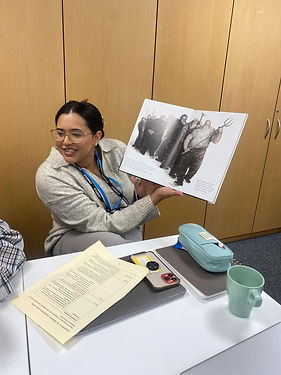
Interview Preparation

You’ve taken an important step by applying for teacher training. Now it’s time to start getting ready for your interview. This page is here to support you in preparing, whether or not you’ve already received an interview invitation.
What is the purpose of teacher training interviews?
The purpose of teacher training interviews are to:
-
Understand your motivations, values, and readiness to train.
-
See how you think, reflect, and respond to teaching scenarios.
-
Check your potential to grow and adapt, not just your existing knowledge.
-
Assess certain professional and personal qualities essential in teaching.
Your interview experience will typically include a few different elements: interview questions, a teaching-oriented task (mini-teach or similar), and written tasks or assessments.
What will be assessed in my interview?
Your interview won’t be about catching you out — it’s a chance for us to get to know you and understand your potential as a trainee teacher. Here are some key areas you might be asked to reflect on:
1
Motivation & Fit
Interviewers will want to understand why you want to become a teacher and what excites you about the profession. You may be asked why teaching appeals to you, what experiences have shaped your decision, and why Prestolee SCITT feels like the right place for your training. Think about moments where you’ve worked with children or seen good teaching in action, and how those experiences have inspired you to take this next step.
2
Understanding the Role of a Teacher
It’s important to show that you have a realistic picture of what teaching involves. You might be asked what you think makes a good teacher, what challenges you expect to face, or how you would describe the day-to-day role. We don’t expect you to know everything yet, but reflecting on the balance between planning, teaching, assessment, and supporting children’s wellbeing will help demonstrate your awareness of what lies ahead.
3
Awareness of Professional Responsibilities
Teaching is more than what happens in the classroom; it’s also about upholding professional standards and acting as a role model. In your interview, you may be asked how you would maintain professionalism both inside and outside of school. This could include using social media responsibly, respecting confidentiality, working effectively with colleagues, and engaging positively with parents and the wider community. Demonstrating that you understand the expectations of a teacher (and that you’re ready to grow into this role) will help you stand out as a committed and reflective applicant.
4
Safe & Positive Learning Environments
A core part of teaching is helping children feel safe and ready to learn. You may be asked how you would promote positive behaviour in the classroom, how you would build respectful relationships, and what safeguarding means to you. Schools expect teachers to know how to keep children safe and maintain professional boundaries. Think about how you would combine warmth with consistency, and how you’d help create a calm, supportive classroom atmosphere.
5
Reflection & Resilience
Teacher training can be challenging, so interviewers will want to know how you reflect and grow. You may be asked about a time when you received feedback or faced a setback, and what you did as a result. What matters most is your willingness to learn from experience, adapt, and keep going with a positive mindset. Being open about mistakes and showing how you’ve developed resilience will reassure the panel that you can thrive on the course.
6
Subject Knowledge / Curriculum
We don’t expect you to arrive with detailed curriculum expertise, but showing awareness of the National Curriculum and key focal points in primary education is important. For example, reading and phonics are central to children’s early learning, and understanding why they matter will help you demonstrate your commitment to teaching. Subject knowledge may be explored through short tasks or interview questions, but what we’re looking for is curiosity, engagement with current priorities in education, and a willingness to build strong knowledge during training.
Using AI to Prepare
AI can be a useful tool in getting ready for your interview, but it should only ever be used to support your preparation.
The best ways to use AI is to generate practice questions on common teaching themes, help you structure your reflections on past experiences, and identify areas where you could give more specific examples.
What AI should not do is write your answers for you. Reading from a script or relying on AI-generated responses will not help you perform well, and AI use in interview tasks will not be tolerated.
Think of AI as a supportive tool. It can prompt, refine and guide, but your interview needs to represent you: your motivations, your voice, and your genuine experiences.
If you’d like more advice, take a look at our free guide on making the best use of AI in preparing for teacher training.

Our Advice
Interviews can feel daunting, but small steps can make a big difference to how calm and confident you feel on the day. Here are some simple ways to put yourself in the best place physically and mentally:
A Good Night's Sleep
Make sure you get a good night's sleep before your interview. Being well-rested can help you think more clearly and stay focussed.
Eating Well
Having a good breakfast and/or lunch before your interview will help your concentration. Make sure you stay hydrated too, avoiding caffeine if possible (as this can add to nerves!).
Your Interview Environment
We highly recommend planning where you will be completing your interview in advance, so it is one less thing to worry about on the day. Find somewhere quiet and comfortable, ensuring there are minimal distractions. We also suggest testing your technology setup!
Positive Mindset
Remember, we're not expecting anyone to be a finished product when we interview. What we are looking for is potential as a trainee teacher, so demonstrate your willingness to learn.

.jpeg)

.jpeg)
